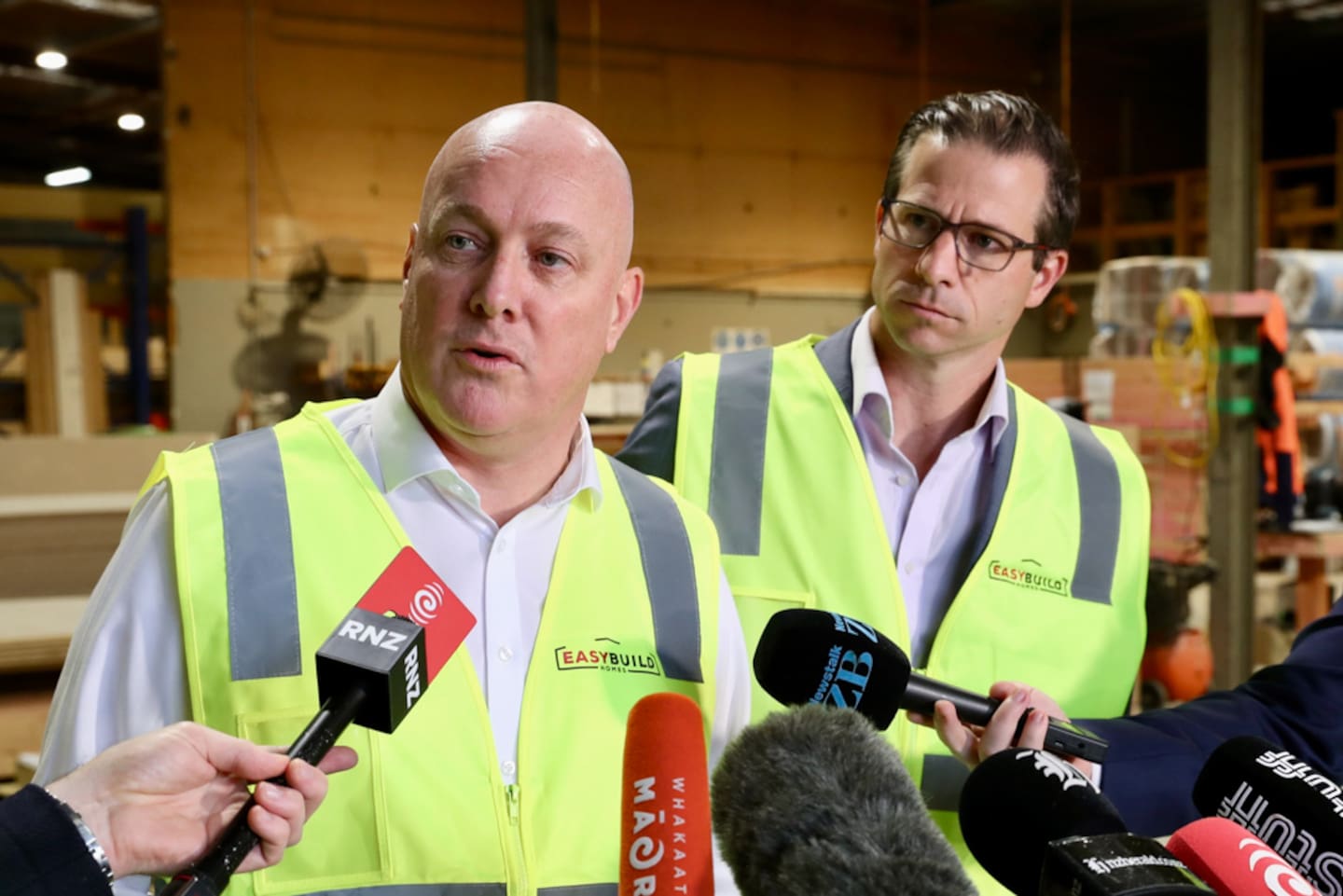Prime Minister Christopher Luxon has announced three major changes to building supplies to address shortages.
Luxon appeared in Upper Hutt today alongside Building and Construction Minister Chris Penk to announce the elimination of border barriers for overseas building products.
The changes were about “cutting red tape and ensuring we can build more houses in New Zealand,” Luxon said.
“We want to make it easier and cheaper to build.”
He wanted to change the laws for new builders and those hoping to add an extension to an existing home.
He spoke of the three major changes announced earlier this morning, explaining the changes will be “good wins” for the building sector and New Zealand as a whole.
The three changes are:
- Recognising building product standards from trusted overseas jurisdictions removing the need for designers or builders to verify standards, which is time-consuming and costly.
- Requiring Building Consent Authorities to accept the use of products that comply with specific overseas standards that are equivalent to or higher than those in New Zealand.
- Approving the use of building products certified through reputable certification schemes overseas. For example, the approval of one Australian scheme, WaterMark, could immediately provide Kiwis with access to 200,000 products.
Penk said the changes would provide competition in the industry and would make New Zealand building products better.
He said they will start looking at Australian products first, but the view will be expansive across the map in the near future.
There would be some checks and balances in New Zealand for “seismic” differences, and we may only take products from countries that are also earthquake-prone.
“There needs to be a comparable jurisdiction,” Penk said.
Penk said Australia was a big inspiration for the legislation and they would be trying to get all the legislation passed by the end of the year.
“Building products are only part of the picture,” Penk said in response to how much this would drive down the comparable cost to our Australian counterparts.
He could not say how much this would level the playing field by.
“It just has to be a lot less than it is now,” Luxon said.
 Prime Minister Christopher Luxon made an announcement with Building and Construction Minister Chris Penk about measures to tackle building supply shortages. Photo / Mark Mitchell
Prime Minister Christopher Luxon made an announcement with Building and Construction Minister Chris Penk about measures to tackle building supply shortages. Photo / Mark Mitchell
He noted plumbing products were much cheaper in Australia, and said bringing more products into the market would allow exports for New Zealand-made products, which would help the economy.
Speaking briefly on the increasing of FTEs since he came into power, he said it was “disappointing” and it went against what he “has been very clear about”.
Luxon also responded to questions about public servants that may be losing their jobs today, saying it was “tough for anyone”.
“It’s been tough for private sector workers as well . . . due to the economic mismanagement to the previous government,” Luxon said.
They wanted ”every dollar to be respected” and did not want anyone’s tax dollars to be looked over.
The changes come amid revelations core government departments were still hiring at a considerable clip late last year, even as a new Government took the reins, promising to reduce their ranks.
Penk said the cost of building a house in New Zealand has risen by 41 per cent and is 50 per cent more expensive than our Australian counterparts.
The driving force of the costs is the lack of overseas building products, Penk said.
“For example, it is almost impossible to use new building products in New Zealand without facing huge delays, with some approval pathways taking up to two years before a new product is recognised for use,” Penk said.
“This red tape entrenches the use of well-known products, which lowers competition, increases the risk of supply chain disruptions like in the recent GIB shortage, and ultimately makes it more expensive to build anything.”
There are three big changes they are enacting, Penk said.
 Chris Penk said the changes would create more competition in the industry. Photo / Mark Mitchell
Chris Penk said the changes would create more competition in the industry. Photo / Mark Mitchell
He has also promised to remove the building levy for all projects under $65,000 and required Building Consent Authorities to submit timeframes for building consents.
“We’re also cutting red tape and costs on farmers building small dams by raising the height threshold for safety regulations from one to four metres,” Penk said.
Penk said this would be a “major shakeup” that will force the cost of building down.
This morning, the Herald reported new data from the Public Service Commission (PSC) that showed full-time equivalent staff increased by 4.1 per cent, and reached an all-time high of 65,699 full-time equivalent positions (FTEs) across the public service in the six months to December 31.
The figures suggested that agencies responded to the previous Government’s belated efforts at trimming public service spending – starting around mid-2023 – by cutting outside contractors and consultants, while continuing to expand hiring into their own ranks.
A spokesman for the PSC said the workforce increase through the second half of 2023 reflects the work programmes and priorities of the previous Government: “numbers are expected to drop in line with the Government’s savings and efficiency drive and as Budget 24 decisions start to flow through.”
The new National-led Coalition Government has promised to cut annual public service spending by 6.5 to 7.5 per cent, the fine detail of which is up to the public service bosses, according to Finance Minister Nicola Willis, who is also Minister for the Public Service.
Willis hadn’t responded to the Herald’s questions about the latest PSC data.
Adam Pearse is a political reporter in the NZ Herald Press Gallery team, based at Parliament. He has worked for NZME since 2018, covering sport and health for the Northern Advocate in Whangārei before moving to the NZ Herald in Auckland, covering Covid-19 and crime.
This article was originally published on NZ Herald here.
Take your Radio, Podcasts and Music with you









